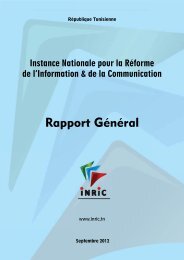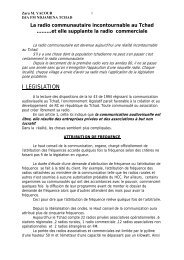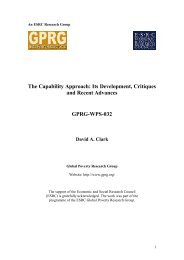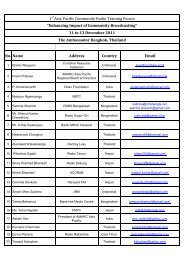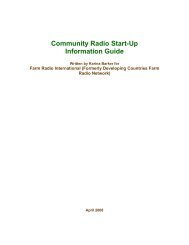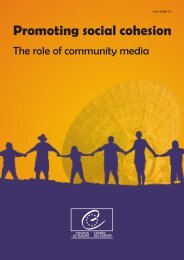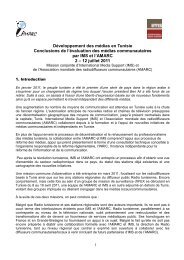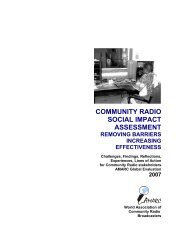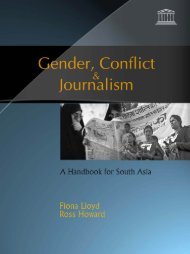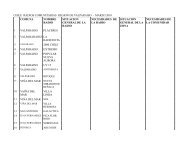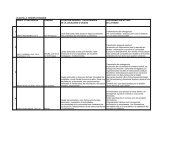Women's Empowerment and Good Governance Through - amarc
Women's Empowerment and Good Governance Through - amarc
Women's Empowerment and Good Governance Through - amarc
You also want an ePaper? Increase the reach of your titles
YUMPU automatically turns print PDFs into web optimized ePapers that Google loves.
53<br />
Best Experiences for an Action Research Process<br />
tions <strong>and</strong> protocols that recognize the rights of women. The main one is CEDAW (Convention<br />
for the Elimination of Discrimination against Women).<br />
Despite the well-intentioned laws <strong>and</strong> other efforts, research at the national, regional <strong>and</strong><br />
micro-level indicate that broad-based participation of women in community development <strong>and</strong><br />
governance is still minimal, especially in comparison with their numbers.<br />
According to the Ghana Living St<strong>and</strong>ards Survey of 2000, 44.1 per cent of women as opposed<br />
to 21.1 per cent of men have no formal education. At the higher level, the gap is even larger,<br />
with only 2.7 per cent women as compared to 15.8 per cent of men having the higher levels of<br />
education needed for employment in the formal sector.<br />
Factors such as poverty, early marriage <strong>and</strong> teenage pregnancy have also contributed to an<br />
elevated school drop-out rate among girls <strong>and</strong> prevented a large number of females from attaining<br />
a higher education.<br />
Religion, cultural norms <strong>and</strong> the lack of economic power, together with the low level of female<br />
education, have contributed to the low status of women in Ghanaian society.<br />
Women in decision making<br />
Despite the statistics, women have played, <strong>and</strong> continue to play, pivotal roles in the political,<br />
social <strong>and</strong> economic life of Ghana. During the struggle for self-determination, women, including<br />
those who were uneducated in formal terms, struggled <strong>and</strong> fought alongside their male<br />
counterparts in the fight against colonial rule. One, Yaa Asantewaa, has become a revered<br />
figure for taking up leadership in battle where men would not dare.<br />
After the attainment of independence in 1957, the government of the late Osagyefo Dr. Kwame<br />
Nkrumah introduced an affirmative action program for women. Among other features, this<br />
enabled the inclusion of women in the national legislature in recognition of the frontline role<br />
women played in the struggle toward independence. However, in contemporary Ghana, 50<br />
years after independence, the ratio of women to men at the national <strong>and</strong> local government<br />
levels <strong>and</strong> in the public <strong>and</strong> corporate sectors does not reflect that of a nation where over 51<br />
per cent of the population is comprised of women.



